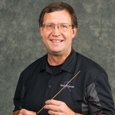I have observed several honor band clinics over the years where the clinician was making the experience less than enjoyable for the students, whether it was because of boring music, a dull personality, or in some cases, an unpleasant demeanor. In some clinics I observed, students even had a hard time figuring out what in the world the director wanted because the conducting was so unclear. I doubt that any of the clinicians were aware of this; they probably went home thinking things went great, only to repeat the same problems at their next clinic.
The survey I use reflects the importance I place on presenting students with challenging but enjoyable music. This is probably the most difficult aspect of a clinic. From the surveys, I have been able to glean that a majority of the students tend to think that the clinic music is too easy, even when it took every second of rehearsal to get the music ready for performance. They have a tendency to look at the difficulty of their own part, not the demands of the music overall. Also, many from strong band programs are used to practicing more difficult pieces over several weeks, not two or three days.
It is quite a fine line for the clinician: challenge students too much and one risks a ragged performance, but present a technically less demanding program and one risks boring them. I have tried to counter this by explaining this dilemma to the students, but it has not helped. At this point, I have almost grown to expect them to say the music is too easy, but I am pleased if they still rated the music as something they really enjoyed. If the music is too easy and they don’t like it, then I need to adjust accordingly.
Ironically, when I have my students in a clinic, I do not mind if the music gets the best of them a little, because I prefer seeing them challenged. On the other hand, as a clinician, I want the performance as clean as possible.
I also like to use the survey to check and make sure that I am communicating clearly, whether through conducting gestures or words, particularly because time is of the essence in a clinic. In ensembles of more than 100, I have found through surveys that players in the back have a hard time hearing, necessitating the use of amplification.
I ask one question about my demeanor in the survey. Some of the most unpleasant directors are ones I’m assuming were nice in their day but have gotten old and crotchety. I want to make sure that doesn’t happen to me – or at least catch it early if it does.
I am often surprised by the musical selection that students like the least. But when the people have spoken, I change the piece out at the next clinic for another one. The ones that they prefer, I keep in the folder for probable inclusion the next time.
I make the final question (What instrument do you play?) optional to retain anonymity for students who are the only ones to play their instrument. However, knowing what instrument survey takers play can be helpful for choosing music for the next time, especially if one section in particular seems to despise one of the pieces. Odds are high that the percussionists will have the most negative comments about the music if several of them were stuck playing triangle and finger cymbals for the entire concert.
I have had a couple of students comment I talk too much, but in long rehearsals I talk more than back at home so the brass players can rest their lips a little. Plus, certain concepts take a little time to cover, but there is limited rehearsal time in which to get them across. Still, I try to reduce the talking as much as I can. I do emphasize certain points that I want them to take home with them, so giving them a chance to write what they have learned provides me an opportunity to see if any ideas stuck. I had one student who liked my comparison of a poor release with a poor tone to a dying gerbil. I guess that means I should use it again.
The survey presented here is not the only way to do it. Directors should tailor and refine the survey to reflect what they believe is most important in a clinic setting.
Please circle your level of agreement with each of the following statements based on your experience at this clinic.
Scale: 1 (strongly disagree) to 5 (strongly agree) Circle Choice
The music was challenging. 1 2 3 4 5
I enjoyed the music. 1 2 3 4 5
The director’s conducting was clear. 1 2 3 4 5
The director’s directions were clearly stated. 1 2 3 4 5
The director was pleasant. 1 2 3 4 5
My overall rating of the clinic is excellent. 1 2 3 4 5
Which music selection did you like the most?
Was there a selection you did not like? Which one(s)?
What is one thing you learned at the clinic?
What is one suggestion you would have to make it a better clinic?
Optional Question: What instrument do you play?






